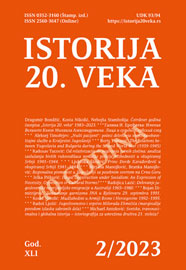REGIONALNA PISMENOST U JUGOSLAVIJI SA POSEBNIM OSVRTOM NA CRNU GORU
REGIONAL LITERACY IN YUGOSLAVIA WITH SPECIAL FOCUS ON MONTENEGRO
Author(s): Mirjana Manojlović, Branka ManojlovićSubject(s): History, Social Sciences, Education, Geography, Regional studies
Published by: Institut za savremenu istoriju, Beograd
Keywords: Regional literacy; Yugoslavia; Montenegro; History; Geography; Education
Summary/Abstract: This paper aimed to present the regional differences in literacy between the former Yugoslav republics with special reference to internal discrepancies in Montenegro. Gender gaps took a central place in the analysis. First, we gave a brief historical overview of the various attitudes towards schooling in the Balkan, divided between the great empires. Religion, finance, government policy, and social norms contributed greatly to the results that persisted during the interwar period. After the Second World War, intensive literacy courses for adults and the expansion of school infrastructure created conditions for significant enhancement. Statistics are a basic source of data. They are methodologically compatible and could be beneficial for some further research in this field. Comparisons were made between republics, as well as within Montenegrin regions. The explanation of the gap between the male and female population is based on complex historical and socio-political circumstances that could be the subject of interdisciplinary research in history, geography, sociology, anthropology, economics, etc. These various factors had an intensive and long-term impact on literacy. However, with coexistence in Yugoslavia, the differences between the republics were reduced to such an extent that they almost disappeared at the beginning of the 21st century. The main reasons are the expansion of the school infrastructure, stricter compliance with mandatory school attendance, but also the state’s insistence on the importance of education. A similar situation is in Montenegro, where illiteracy persists only in closed and marginalized groups. There, poverty is a dominant factor in illiteracy.
Journal: Istorija 20. veka
- Issue Year: 2023
- Issue No: 2
- Page Range: 387-400
- Page Count: 14
- Language: Serbian

